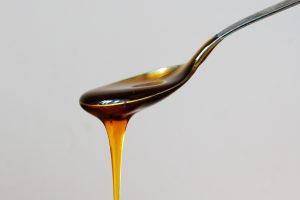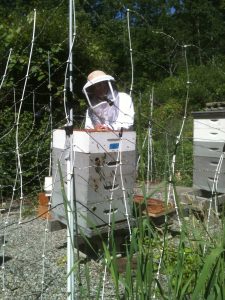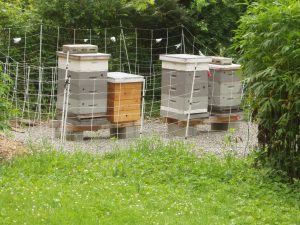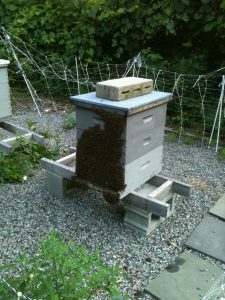
I always gave my children a spoonful of honey on the first day of school, to wish them sweetness in learning. My eldest is still on a school calendar, and she doses herself before returning to her classroom to teach.
The rest of us dip apples in honey every September, to celebrate Rosh Hashanah – the Jewish New Year – that begins at sundown on Sunday, September 9, 2018, according to our civil calendar.
As a child, my family celebrated Rosh Hashanah by attending services and feasting. I always liked the feasting, which took place in the dining room on the linen-draped table set with silver and special occasion china. I didn’t like the services so much: I neither knew Hebrew nor understood what was going on. I felt excluded and bored.

Living in rural Vermont has given me a new, albeit unorthodox, appreciation for starting the New Year in the fall. This is a bittersweet time: just as summer is winding down, the garden is laden with the food that will sustain us. Here in the countryside, spring and summer are times of intense activity, from planting to playing to putting up food that will nourish us the second half of the year.
Fall and winter are more introspective, and Rosh Hashanah introduces the Days of Awe –a time for reflection, for asking and granting forgiveness for our own and others’ misdeeds. It’s a time to think about how to live a more loving and ethical life.
The Days of Awe end on Yom Kippur, The Day of Atonement, when we ask to be written into the Book of Life for another year. It’s also a day to remember the dead.
Observant Jews will spend the day fasting and praying in synagogue.
Not me.

I’d call myself religious rather than observant, with reverence for the secular world where I
abide with hope and faith. I have faith in nature to heal, and hope for humanity despite the news of the day.
While the world’s religions may offer succor to individuals, collectively they seem to cause more harm than good as their adherents jockey for righteousness.
It’s the rituals that ground me: candles, drinking wine, breaking bread – and spoons full of honey. Candles illuminate the dark. Grapes become wine. Breaking bread is an act of companionship; the word itself comes from the Old French companion, meaning “one who breaks bread with another.”
And honey.

Bees gather nectar from flowers, return to the hive, and by fanning their wings, evaporate the nectar to its sweet, syrupy essence. The average field bee produces about one-twelfth of a teaspoon in her six-week lifespan. That doesn’t sound like much, but with over a hundred thousand bees working together for the common good it adds up gallons and gallons of honey.
For me, the ritual of a spoonful of honey doesn’t just offer the promise of a sweet year of learning; it also offers me hope.
May your New Year be filled with sweetness and light.
What a lovely article Deborah and I wish you and your family a very happy Rosh Hashanah.
It is sad to see the evenings drawing in and I will miss the extra light that spring and summer bring, but I also look forward to snuggling into jumpers and scarfs and (say it quietly) starting plans for the family Christmas.
I am no longer religious but I miss the rituals you mention, which became part of the Christian tradition. I do so wish that we had secular alternatives; as you say, rituals are grounding and help bind us to each other, to those who went before us and to those who will be part of our future.
Judith
L’shana Tova to you and your wonderful family and loved ones …..and Leo too.
Thanks so much Deborah ! I’m glad to say that a new “baby” MAC is allowing me to use your comment box . Many of your recent posts have made me want to comment and now I can. YAY!
Your writing sweetens my life . I’ve forwarded this to my daughter(and only child); to my only sister, and to my childhood friend to sweeten theirs. Thanks again.
Thanks for this uplifting article, Deb. L’Shanah Tovah to you and the family!